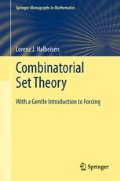Abstract
In this chapter we shall investigate combinatorial properties of certain families of infinite subsets of ω. In order to do so, we shall use many of the combinatorial tools developed in the preceding chapters. The families we investigate—particularly P-families and Ramsey families—will play a key role in understanding the combinatorial properties of Silver and Mathias forcing notions (see Chapter 22 and Chapter 24 respectively).
Access this chapter
Tax calculation will be finalised at checkout
Purchases are for personal use only
References
Tomek Bartoszyński, Haim Judah: Set Theory: On the Structure of the Real Line. AK Peters, Wellesley (1995)
Andreas Blass: The Rudin-Keisler ordering of p-points. Trans. Am. Math. Soc. 179, 145–166 (1973)
David Booth: Ultrafilters on a countable set. Ann. Math. Log. 2, 1–24 (1970)
Lorenz Halbeisen: A playful approach to Silver and Mathias forcings. In: Foundations of the Formal Sciences V: Infinite Games, Stefan Bold, Benedikt Löwe, Thoralf Räsch, Johan van Benthem (eds.), Papers of a Conference held in Bonn, November 26–29, 2004. Studies in Logic, vol. 11, pp. 123–142. College Publications, London (2007)
Jaime I. Ihoda: Unbounded filters on ω. In: Logic Colloquium ’87, Proceedings of the Colloquium held in Granada, Spain, July 20–25, 1987, J. Fernandez-Prida, M. Garrido, D. Lascar, M. Rodriguez Artalejo (eds.). Studies in Logic and the Foundations of Mathematics, vol. 129, pp. 105–115. North-Holland, Amsterdam (1989)
Jussi A. Ketonen: On the existence of P-points in the Stone–Čech compactification of the integers. Fundam. Math. 92, 91–94 (1976)
Claude Laflamme: Filter games and combinatorial properties of strategies. In: Set Theory, Tomek Bartoszyński, Marion Scheepers (eds.). Contemporary Mathematics, vol. 192, pp. 51–67. Am. Math. Soc., Providence (1996)
Adrian Richard David Mathias: Happy families. Ann. Math. Log. 12, 59–111 (1977)
Adrian Richard David Mathias: 0# and the p-point problem. In: Higher Set Theory, Proceedings, Oberwolfach, Germany, April 13–23, 1977, Gert H. Müller, Dana S. Scott (eds.). Lecture Notes in Mathematics, vol. 669, pp. 375–384. Springer, Berlin (1978)
Walter Rudin: Homogeneity problems in the theory of Čech compactifications. Duke Math. J. 23, 409–420 (1956)
Saharon Shelah: Proper Forcing. Lecture Notes in Mathematics vol. 940. Springer, Berlin (1982)
Saharon Shelah: Proper and Improper Forcing. Perspectives in Mathematical Logic. Springer, Berlin (1998)
Jan van Mill: An introduction to βω. In: Handbook of Set-Theoretic Topology, K. Kunen, J.E. Vaughan (eds.), pp. 503–567. North-Holland, Amsterdam (1990)
Edward L. Wimmers: The Shelah P-point independence theorem. Isr. J. Math. 43, 28–48 (1982)
Author information
Authors and Affiliations
Corresponding author
Rights and permissions
Copyright information
© 2012 Springer-Verlag London Limited
About this chapter
Cite this chapter
Halbeisen, L.J. (2012). Happy Families and Their Relatives. In: Combinatorial Set Theory. Springer Monographs in Mathematics. Springer, London. https://doi.org/10.1007/978-1-4471-2173-2_10
Download citation
DOI: https://doi.org/10.1007/978-1-4471-2173-2_10
Publisher Name: Springer, London
Print ISBN: 978-1-4471-2172-5
Online ISBN: 978-1-4471-2173-2
eBook Packages: Mathematics and StatisticsMathematics and Statistics (R0)

